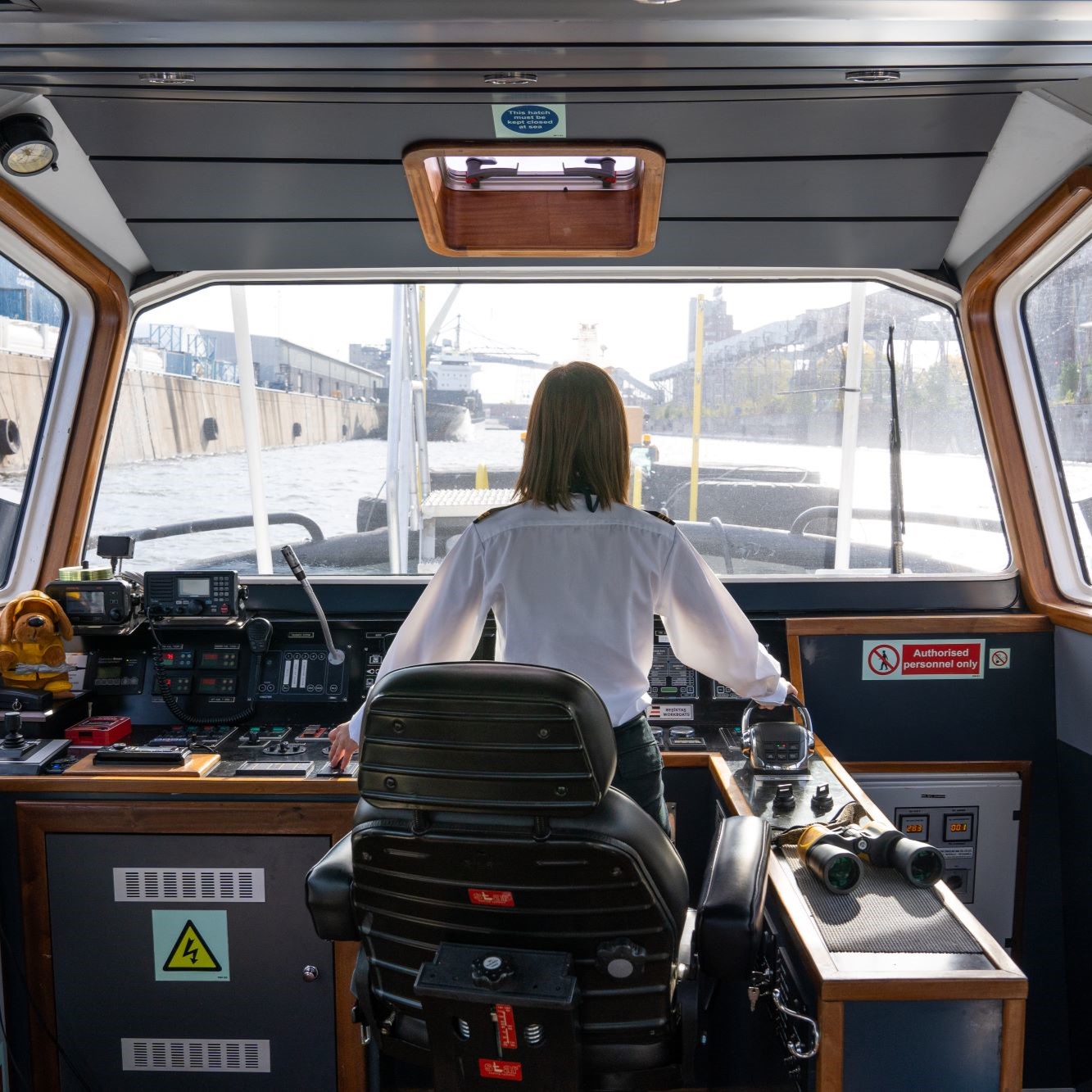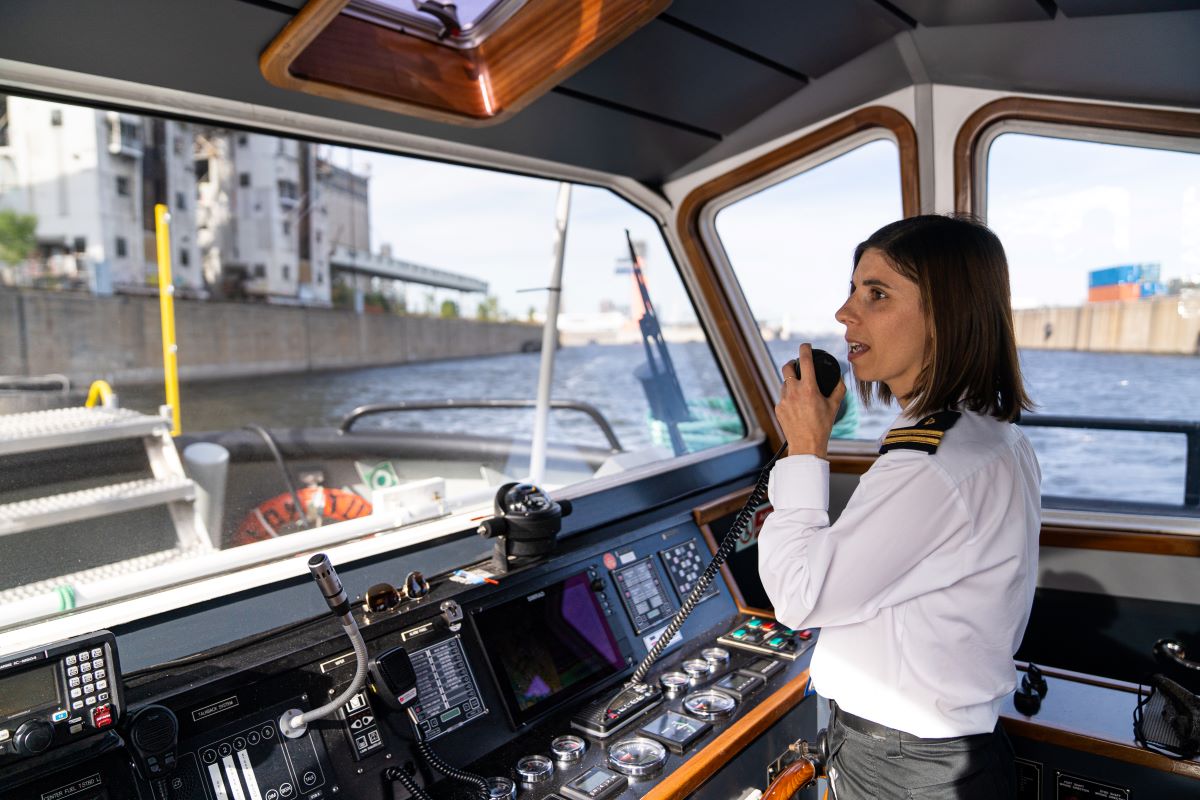
Women in maritime careers: Katryne Parenteau's inspiring story
Katryne Parenteau is Supervisor, Marine Work and Floating Equipment at the MPA. But she is also someone who is impassioned and has a pioneering spirit, who joined the Royal Canadian Sea Cadets at the age of 12 and went on to become Canada’s very first female ice pilot. She recently took her career to the next level by earning a master’s degree in maritime management from Memorial University of Newfoundland. Congratulations on this achievement and on your success in a field that is still largely male-dominated!

Why did you choose to do this master’s degree?
My goal behind undertaking this Master in Maritime Management (MMM) was to deepen my knowledge of the sector, develop my critical thinking skills and broaden my understanding of the issues shaping the global marine industry. The program made it possible for me to gain a better strategic view of port operations and a better understanding of the factors that influence business decisions. It also honed my management and leadership skills.
How long did it take you to complete?
I finished my master’s degree in five years while working full time at the Montreal Port Authority. It was demanding but extremely rewarding. It let me apply my theoretical knowledge right in my workplace, which made the experience even more valuable.
What did you like in the experience?
What I especially liked about this experience was the wide range of learning opportunities, from strategic management to the technical aspects of marine operations. The discussions with other students, not only from Canada but also from different countries, were quite enriching and gave me greater perspective. One of my achievements and something I’m very proud of is my master’s thesis, which is directly related to the Port of Montreal and focused on optimizing port operations by implementing the Port Community System (PCS) at the Port of Montreal. This project made it possible for me to apply my knowledge in real life and contribute to strategic thinking on how to improve port operations. This master’s degree also gave me the opportunity to step back from my day-to-day work and develop a broader view of the industry, which added to my professional practice and enabled me to make contributions to my work environment.
What was your experience as a woman in a predominantly male environment?
The marine industry has historically been a male environment, but I never really had any trouble fitting in. As the first female ice pilot in Canada, it’s true that people often looked at me a little differently, especially at first, when I boarded the vessel. However, once the captains recognized my competence and expertise, I gained their respect and was treated as an equal. I’ve always relied on my know-how and commitment, and I am fortunate to work in an environment where my work is appreciated. I’m also seeing e a growing openness towards diversity in the industry. I love my job, and I believe my drive and my desire to learn were key to overcoming the challenges. I hope my career path can encourage other women to consider pursuing a career in this exciting field.
What does an ice pilot do?
Since 2015, I’ve been working as an ice pilot, which is a specialized job that consists of guiding foreign vessels, in winter, through the Gulf of St. Lawrence between Cabot Strait and Les Escoumins. My role on board is to assess the state of the ice, advise captains on safe navigation in these extreme conditions, monitor the vessel’s progress through the ice and freezing spray, and optimize routes to minimize risks such as getting stuck in the ice or having ice accumulate on the vessel’s deck. Every winter, I try to do one or two contracts, which means leaving home for anywhere from four to eleven days. I was the first woman in Canada to do this job and, for several years, the only one.
What challenges did you face along the way?
There were lots of challenges! Juggling a full-time job, family life, pregnancy and maternity leave while writing a master’s thesis with a baby at home wasn’t easy. It took a lot of organization and perseverance. On top of that, studying as I approach my forties presents different challenges from when I was twenty. Despite everything, it was extremely fulfilling. This experience let me push my limits and accomplish so much, both in my life and at work.
Any closing remarks?
This master’s degree was a milestone in my professional and personal development, and I am extremely grateful to my director and colleagues who supported me all the way through. I look forward to applying my new knowledge and contributing even more to the ongoing development of the Port of Montreal and the maritime sector.
